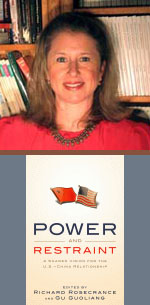Impacting international relations

Impacting international relations
- May 19, 2009
- UCI prof collaborates with international scholars to impact U.S-China relations, findings detailed in new book, Power and Restraint: A Shared Vision for the U.S.-China Relationship
 The emergence of the Soviet Union as a rising superpower led to strong competition
with the U.S. and a Cold War marked by dangerously tense episodes at its brink including
the Cuban Missile Crisis. Whereas some regard the rise of China as leading to a similar
pattern, the outcome is far from inevitable, says Etel Solingen, UCI political science
professor.
The emergence of the Soviet Union as a rising superpower led to strong competition
with the U.S. and a Cold War marked by dangerously tense episodes at its brink including
the Cuban Missile Crisis. Whereas some regard the rise of China as leading to a similar
pattern, the outcome is far from inevitable, says Etel Solingen, UCI political science
professor.
For the past 2 years, she has collaborated with scholars from the Harvard Kennedy
School and the Chinese Academy of Social Sciences to find ways to avoid confrontation
by promoting a mutual understanding of the common goals and challenges the two nations
face. These include the global financial crisis, international trade, the fate of
North Korea's and Iran nuclear programs, global warming, Taiwan, military modernization,
and other threats to peace and stability.
The group's findings are detailed in Power and Restraint: A Shared Vision for the U.S.-China Relationship, a new book which was recently presented to the Washington, D.C. scholarly, policy
and media community at a special event sponsored by the Woodrow Wilson International
Center for Scholars. Foreign Relations Committee Chairman Senator John Kerry and Chinese
Ambassador to the United States Zhou Wenzhong addressed the event which was co-sponsored
by the Harvard Kennedy School, the Kissinger Institute on China and the United States,
and the China-US Exchange Foundation.
Solingen's contribution to the project includes a study on how domestic transformations
in China, both economic and political, could positively impact its peaceful rise as
a great power and avoid potential conflict scenarios that history has shown often
accompany rising nations.
An internationally recognized scholar, Solingen is the most recent recipient of the
American Political Science Association's 2008 Woodrow Wilson Foundation Award for
the best book on government, politics, or international affairs for her book, Nuclear Logics: Contrasting Paths in East Asia and the Middle East. The book was also recognized with the 2008 Robert Jervis and Paul Schroeder Award
for the Best Book on International History and Politics, awarded by the section on
International History and Politics of the APSA.
Share on:
Related News Items
- Almeida named Dynamic Womxn Faculty Academic Achievement Award recipient
- Congratulations to the political science scholars elected to the 2025 class of the Andrew Carnegie Fellowship Program
- Best high-yield checking accounts in 2025 - May 2025
- Seeds for success
- Supporting the next generation of college students


connect with us: